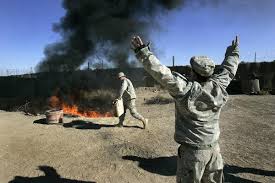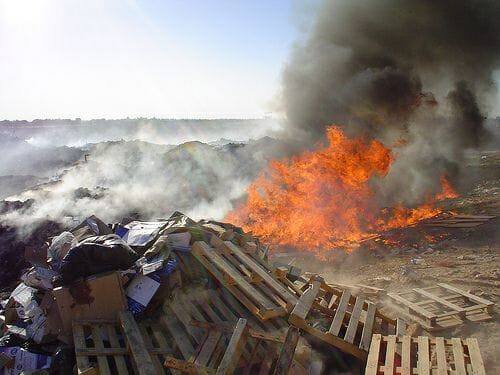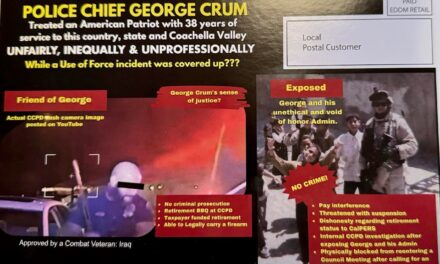PALM DESERT — A local veteran, Jennifer Kepner, who died from cancer connected to her exposure to burn pits in Iraq is the impetus for Democratic Rep. Raul Ruiz’s introduction of H.R. 6959, the Burn Pit Registry Enhancement Act, bipartisan legislation.

Jennifer Kepner and her two children
Ruiz’s legislation comes one year after the 39-year-old Cathedral City woman died. Kepner died Oct. 18, 2017 at home surrounded by friends and family. She was the mother of two children.
While fighting for her life, she was also fighting to have the VA recognize the connection between her cancer and her exposure to burn pits during her service. H.R. 6959 will improve the burn pits registry by allowing entries to be updated with the cause of death after a registered veteran passes away. This is important because it will expand and improve the data available for studies related to burn pits, helping researchers determine the full range of diseases and negative health outcomes that can result from exposure to burn pits.
H.R. 6959, the Burn Pit Registry Enhancement Act, is cosponsored by Republican Rep. Brad Wenstrup (OH-02) and has been endorsed by the Iraq and Afghanistan Veterans of America, Veterans of Foreign Wars, Burn Pits 360.
During the conflicts in Iraq and Afghanistan, burn pits were used as a primary method to dispose of waste and garbage generated on American military bases. Items including human and medical waste were indiscriminately burned, releasing an array of pollutants including particulate matter and known carcinogens. Within months or years after returning from deployment, young servicemembers and veterans exposed to the burn pits are suffering from pulmonary issues, insomnia, and cancer.
In 2013, the Department of Veterans Affairs created the Airborne Hazards and Open Burn Pit Registry to initiate data-collection and tracking of veterans exposed to burn pits and their health conditions. In 2017, the National Academies of Sciences conducted an assessment on the burn pits registry, but could not provide mortality data because the registry does not track cause of death. H.R. 6959 will help address this shortfall and improve the quality of research on the health effects of burn pits.
Staff Sgt. Jennifer Kepner served in the U.S. Air Force from 2001-2007, including six months in 2006 at Balad Air Base in Iraq. The large burn pit at Balad Air Base covered 10 acres and burned over 240 tons of trash each day. After exhaustive work to investigate the potential causes of her cancer, Jennifer’s oncologist determined her exposure to burn pits in Iraq as the only identifiable and plausible risk factor for her cancer.
“While Jennifer fought for her life against cancer, she also had to fight tooth and nail to get the health care she needed and had earned from the VA,” Dr. Ruiz, CA-36, said in a prepared statement. “That is simply wrong and something no veteran should have to experience. This bill honors Jennifer’s experience by making sure that the burn pit registry properly accounts for her passing and cause of death, improving data and research on burn pit exposure. Burn pits robbed our community of one of the bravest and most compassionate souls I have ever met. Jennifer’s empathy for her fellow veterans is why I won’t stop fighting until every servicemember and veteran exposed to burn pits can access the health care they need and has the benefits they have earned and deserve.”
 In a prepared statement, Ben Kepner, Jennifer Kepner’s husband, said, “I want to thank Dr. Ruiz for carrying on Jennifer’s work to make sure her fellow veterans don’t have to go through what she did to get her health care and benefits. It means so much to our family for her legacy and spirit of service to live on in this way and I know she would be happy knowing that progress is being made to help veterans exposed to burn pits.”
In a prepared statement, Ben Kepner, Jennifer Kepner’s husband, said, “I want to thank Dr. Ruiz for carrying on Jennifer’s work to make sure her fellow veterans don’t have to go through what she did to get her health care and benefits. It means so much to our family for her legacy and spirit of service to live on in this way and I know she would be happy knowing that progress is being made to help veterans exposed to burn pits.”
More than 150,000 veterans have signed up for the VA’s Burn Pit Registry so far, which clearly shows that there’s a need to further study and provide help for those who were exposed to toxins during while deployed, according to Carlos Fuentes, VFW National Legislative Service Director.
“Allowing a cause of death to be entered into the database is not only common sense but will help VA understand the scope and severity of the problem and hopefully provide answers on how to protect our service members as they continue to faithfully answer the call of duty in times of crisis,” Fuentes said.
“Addressing military exposures to burn pits and other airborne toxins is a top priority for Iraq and Afghanistan Veterans of America,” said Tom Porter, IAVA Legislative Director. “IAVA applauds Reps. Ruiz and Wenstrup for their bipartisan proposal that will strengthen and increase the quality of data in the VA’s Burn Pit Registry and help track mortality rates and long-term health effects.”







